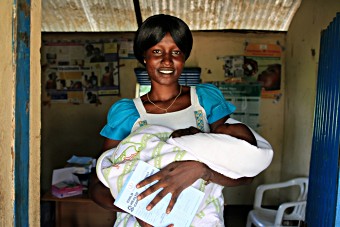
Jackline Juan cradles her six-week-old daughter Keji Francis soon after the baby's first dose of pentavalent vaccine at Walag'lang Clinic in South Sudan.
Credit: GAVI/2014/Mike Pflanz
Geneva, 30 July 2014 – The five-in-one pentavalent vaccine is being used in all GAVI Alliance-supported countries – now the race is on to increase coverage of the vaccine which protects children against five life-threatening diseases.
Pentavalent, which protects against diphtheria, tetanus and pertussis (DTP) as well as hepatitis B (hepB) and Haemophilus influenzae type b (Hib), was first introduced with GAVI support in Kenya in 2001. South Sudan became the 73rd and final GAVI-supported country to introduce the vaccine on 16th July 2014.
The Government of South Sudan predicts that 450,000 children will receive pentavalent vaccine in the next 12 months. Globally, the Alliance estimates that more than 230 million children in the 73 poorest countries of the world will have benefitted from pentavalent vaccine by the end of 2015.
Compelling story
“We are at the end of the first chapter in a compelling story,” said Dr Seth Berkley, CEO of the GAVI Alliance. “Little more than a decade ago pentavalent was only available on the private market in the world’s poorest countries and therefore out of the question for the overwhelming majority of children. Today, thanks to leadership from countries and determination and expertise across the Alliance, we are seeing children in the world’s poorest countries being protected on a daily basis with this important vaccine.”
The successful introduction of pentavalent in more than 70 of the world’s poorest countries underlines the dramatic impact of the GAVI Alliance in increasing access to life-saving technologies. The Alliance partners – implementing and donor countries, WHO, UNICEF, the World Bank, civil society organisations and technical experts – have worked together to achieve this milestone in public health.
By bringing together demand from countries and predictable financing from donors, the Alliance has been able to create a sustainable market for pentavalent. Vaccine manufacturers, including some from developing countries, have responded with huge increases in production capacity to ensure secure supplies of the vaccine leading to increased competition which enables the GAVI Alliance to purchase the vaccine for as little as US$ 1.19 per dose.
Reaping the benefits
Countries are reaping the benefits of introducing a vaccine that protects against hepB and Hib on top of the traditional DTP. By combining all the antigens into a single shot, children are being protected against additional diseases without the need for extra storage or logistical capacity at country level.
This is especially important in conflict-affected and fragile countries such as Somalia, the Democratic Republic of the Congo and North Korea, all of which have introduced pentavalent vaccine, where the capacity of health systems is often limited, especially in rural areas and urban slums.
While offering protection against serious illness, the pentavalent vaccine reduces anxiety for mothers and babies as it confers protection in a three dose course of single shots instead of requiring separate injections three times over for DTP, hepB and Hib.
The successful introduction of the vaccine in the world’s 73 poorest countries marks the completion of stage one of the Alliance's work to increase access to pentavalent vaccine. The main challenge for stage two will be to support countries to increase the coverage levels by making it available to children no matter where they live.
Increase coverage levels
GAVI Alliance partners are working to increase coverage levels from 53% at the end of 2013 to 77% by the end of 2015. The Alliance is aiming to support further increases in coverage through its 2016-2020 strategy
Success in three key countries – India, Indonesia and Nigeria – that account for 35 million new babies each year will be central to achieving major increases in coverage.
Indonesia and India have rolled out the five-in-one vaccine in a limited number of states so far but both are planning to rapidly increase access by rolling out nationwide in the coming months. Nigeria has low coverage rates with large regional disparities. The GAVI Alliance is working with the country to improve coverage in the coming years.
“As an Alliance we have clearly demonstrated how new vaccine technology can be taken to scale globally with the world’s poorest countries,” added Dr Berkley. “Our next challenge is to support some of the world’s largest countries to expand and strengthen their programmes to ensure they are reaching every child.”
